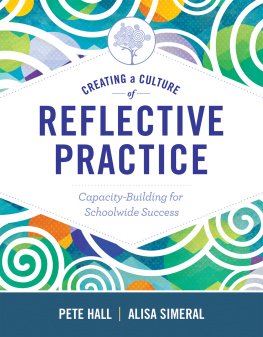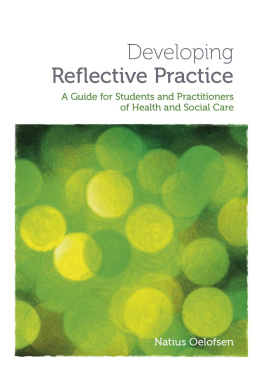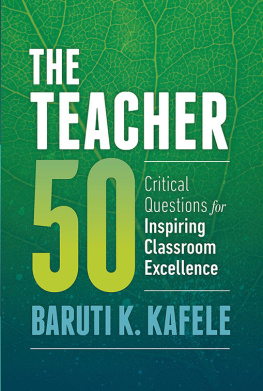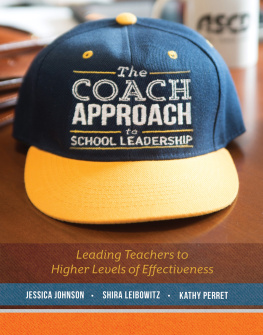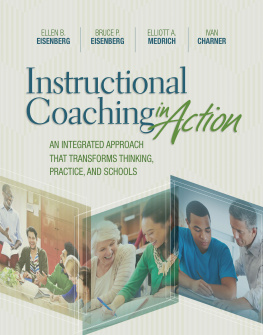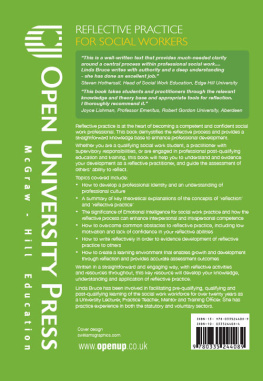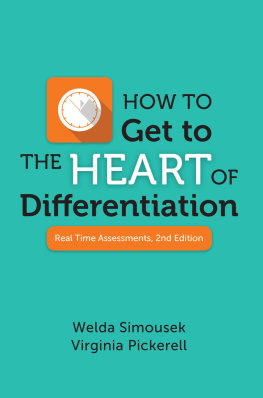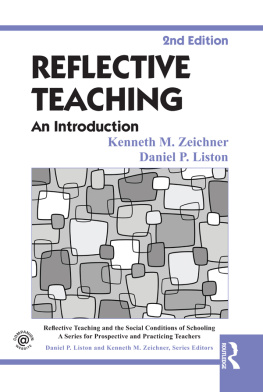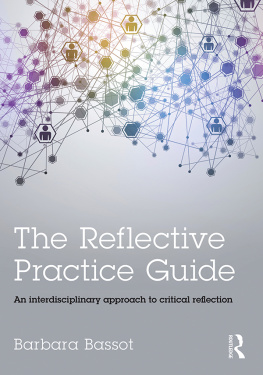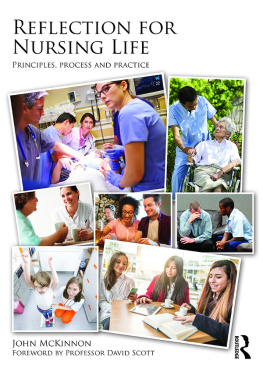Contents
Guide
Pages
Dedication
....................
To Myn, Reno, Junior, and PJ: You're my North Star. I love you.
Pete Hall
To Gin: At 95 years, you haven't stopped learningor teaching. I love you.
To my children J and O, without whom this book would have been completed months earlier (sorry, Pete!): You inspire me and make me so proud. Always be the best you can be.
Alisa Simeral
Preface
....................
When we first wrote Building Teachers' Capacity for Success: A Collaborative Approach for Coaches and School Leaders (or BTCFS for short; Hall & Simeral, 2008), our work was more theoretical, based upon a strong case study (Anderson Elementary School in Reno, Nevada) and a few additional sample projects smattered about the United States. If you're interested in the Anderson School turnaround story, look up the Educational Leadership article "A School Reclaims Itself" (Hall, 2005). That's where Pete explains how the school went from being the lowest-achieving school in Nevada (the only school to have failed to make its Adequate Yearly Progress goals for four consecutive years) to the only Title I school in the state to earn a High Achieving designation just two years later.
Now, nearly a decade after the publication of BTCFS, the research is thorough, the implementations are widespread, and the jury is back: the philosophy, model, structures, and strategies within BTCFS are guilty of having a positive impact on student learning, through the capacity-building efforts of administrators, coaches, and educators worldwide. And we're not just looking at short-term results; indeed, this approach isn't fulfilled until we've established persistent, enduring, long-lasting, positive change in the belief systems, thought patterns, and collective results in schools and communities.
As one might expect, we have considerably refined our work over the past several years. We are Refinement-stage thinkers, after all, and there's no way our first product arrived as stain-free and streamlined as it could be! And while we thought these updates would serve as a 2nd edition of BTCFS, we quickly realized the breadth and depth of new, exciting, and extensive information herein truly amounts to a new tool, rather than a refurbished one. In fact, we believe this to be the definitive guide to building teachers' capacity.
Our experiences as in-the-trenches practitioners (Pete as a principal of two additional Title I schools; Alisa as a dean of students, instructional coach, turnaround specialist, and coach of coaches) and as in-the-field professional development agents (through years of concurrent consulting work in schools and districts internationally) have verified the impact that this workthis idea, this structure, this approachhas had upon legions of educators in elementary, middle, and high schools, in urban and rural settings, teaching every content imaginable.
If you're interested in exploring the implementations and their early (and long-term) results, you might look into some of the following locations:
- Washoe County (Nevada) School District
- Point Isabel (Texas) Independent School District
- Sarasota County (Florida) Public Schools
- Cypress-Fairbanks (Texas) Independent School District
- Page (Arizona) Unified School District
- Iowa City (Iowa) Community School District
- Gibbes Middle School (Columbia, South Carolina)
- Linn-Mar High School (Marion, Iowa)
- Brule Elementary School (Navasota, Texas)
- White Street School Elementary (Springfield, Massachusetts)
Our initial goal, as we launched this work, was to build a capacity model that truly affected the quality of the instruction delivered by our teachers, strengthened their reflective abilities in order to have a lasting impact, and encouraged collaboration between the administrator, the instructional coach, and other capacity-builders (peers, mentors, teacher-leaders, and others) in our teachers' lives.
Interestingly, in a lot of the early implementations, we encountered instructional leaders who were so hyperfocused on their own roles and strategies, they hadn't yet included their teachers in the work. As they strove to improve reflective practices and technical expertise across their campuses, and despite the best of intentions, they had accidentally excluded the very people whose capacity they were attempting to build! Soon we wrote and published our parallel teacher text, Teach, Reflect, Learn: Building Your Capacity for Success in the Classroom (Hall & Simeral, 2015), to ensure that teachers not only were a part of the conversation but also could take the reins of their own professional growth through the many self-directed options we provided.
At that point, we thought we had all our bases covered (be readythat's just the first of many sports metaphors we've woven into this text). As we scrutinized the implementations and their effectiveness, it was clear that some settings were yielding stronger returns than others, despite the same professional development, resources, activities, and timelines. What made the difference? Well, many things: personnel, context, commitment of the leadersand, more than anything else, the environment established by the leadership. Hence the "culture of reflective practice" that you'll read so much about in this book.
In the preface for BTCFS, we wrote something that still holds true today:
What follows are the current results of our investigation. We write current because as education evolves, information expands, and experience accrues, our understandings of the work we do will continue to change and evolve as well. We'll never know everything we need to know, and we may never achieve our ultimate goal. But the beauty of this work is that while we strive, we make a difference. (p. x)
Throughout this text, we, the authorsone of us a veteran principal and the other a veteran instructional coachadd our individual two cents to the discussion. Sometimes telling an anecdote, sometimes going into a bit more detail, Pete Hall (in "Pete's Perspective") and Alisa Simeral (in "Alisa's Approach") share experiences and outlooks. Our hope is that these asides will add flavor and resonance to the text.
We also want to note that we have provided downloadable, fillable PDF versions of several of the book's tools, templates, forms, and protocols for your immediate use at www.ascd.org/ASCD/pdf/books/HallSimeral2017.pdf (password: HallSimeral117006).
As you read on, we challenge you to critically reflect upon your thinking and your work; we urge you to continuously strive for excellence; we encourage you to cultivate collaborative relationships; and we commend you for making a difference.
Truly, this work would not be possible but for the input and impact of the educators who shaped us, gave us opportunity, and helped to refine our approaches over the years. From the stout trunk of the Frank C. Garrity tree to the common sense of Derek Cordell, from the models of excellence from Kim Price and Lisa Johnson to the fearless leadership of Prim Walters, from the passion of Andre Wicks to the gorgeous lessons of Collette McIntyre, and from the nuanced coaching of Gia Maraccini to the persistent advocacy of Amanda Romeythis list could span to the moon and back, and we love and appreciate each of you that much.

